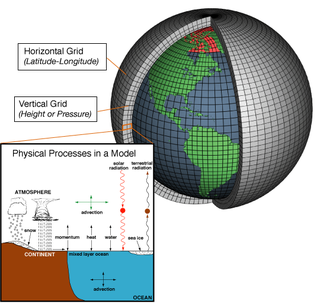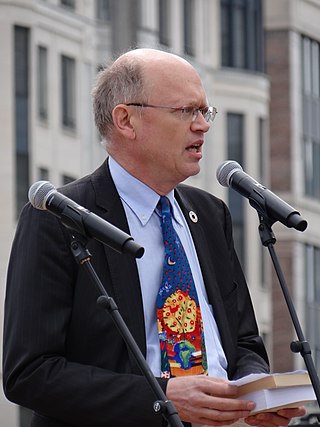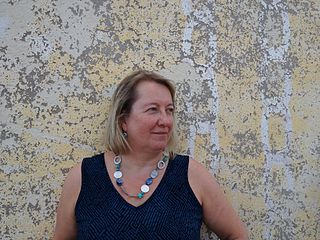Related Research Articles

A general circulation model (GCM) is a type of climate model. It employs a mathematical model of the general circulation of a planetary atmosphere or ocean. It uses the Navier–Stokes equations on a rotating sphere with thermodynamic terms for various energy sources. These equations are the basis for computer programs used to simulate the Earth's atmosphere or oceans. Atmospheric and oceanic GCMs are key components along with sea ice and land-surface components.

Kevin Edward Trenberth worked as a climate scientist in the Climate Analysis Section at the US National Center for Atmospheric Research (NCAR). He was a lead author of the 1995, 2001 and 2007 IPCC assessment reports. He also played major roles in the World Climate Research Programme (WCRP), for example in its Tropical Oceans Global Atmosphere program (TOGA), the Climate Variability and Predictability (CLIVAR) program, and the Global Energy and Water Exchanges (GEWEX) project.
Drew Shindell is a physicist and a climate specialist and professor at Duke University's Nicholas School of the Environment. He is listed as an ISI Highly Cited Researcher. He was a chapter lead of the Intergovernmental Panel on Climate Change (IPCC) October 8, 2018 Special Report on Global Warming of 1.5 °C as well as on the Intergovernmental Panel on Climate Change's Fifth Assessment Report in 2013. He has testified on climate issues before both houses of the US Congress, at the request of both parties. His research concerns natural and human drivers of climate change, linkages between air quality and climate change, and the interface between climate change science and policy. He has been an author on more than 200 peer-reviewed publications and received awards from Scientific American, NASA, the EPA, and the NSF.
Downscaling is any procedure to infer high-resolution information from low-resolution variables. This technique is based on dynamical or statistical approaches commonly used in several disciplines, especially meteorology, climatology and remote sensing. The term downscaling usually refers to an increase in spatial resolution, but it is often also used for temporal resolution. This is not to be confused with image downscaling which is a process of reducing an image from a higher resolution to a lower resolution.

Roger S. Pulwarty is a U.S. scientist of Trinidad and Tobago origin and contributed to the work of the Intergovernmental Panel on Climate Change (IPCC). Pulwarty is the Senior Scientist in the National Oceanic and Atmospheric Administration (NOAA) Physical Sciences Laboratory in Boulder, Colorado.

Jean-Pascal van Ypersele de Strihou is a Belgian academic climatologist. He is a professor of Environmental Sciences at the UCLouvain (Belgium). As a previous vice-chair of the IPCC, Van Yp is one of the forerunners of climate change mitigation through strong decrease of fossil fuel consumption.

The Fifth Assessment Report (AR5) of the United Nations Intergovernmental Panel on Climate Change (IPCC) is the fifth in a series of such reports and was completed in 2014. As had been the case in the past, the outline of the AR5 was developed through a scoping process which involved climate change experts from all relevant disciplines and users of IPCC reports, in particular representatives from governments. Governments and organizations involved in the Fourth Report were asked to submit comments and observations in writing with the submissions analysed by the panel. Projections in AR5 are based on "Representative Concentration Pathways" (RCPs). The RCPs are consistent with a wide range of possible changes in future anthropogenic greenhouse gas emissions. Projected changes in global mean surface temperature and sea level are given in the main RCP article.

Diana Liverman is a retired Regents Professor of Geography and Development and past Director of the University of Arizona School of Geography, Development and Environment in the College of Social and Behavioral Sciences in Tucson, Arizona.

Alan Robock is an American climatologist. He is currently a Distinguished Professor in the Department of Environmental Sciences at Rutgers University, New Jersey. He advocates nuclear disarmament and, in 2010 and 2011, met with Fidel Castro during lecture trips to Cuba to discuss the dangers of nuclear weapons. Alan Robock was a 2007 IPCC author, a member of the organisation when it was awarded the Nobel Peace Prize, "for their efforts to build up and disseminate greater knowledge about man-made climate change, and to lay the foundations for the measures that are needed to counteract such change".
Gerald Allen "Jerry" Meehl is a climate scientist who has been a senior scientist at the National Center for Atmospheric Research since 2001.
Julie Michelle Arblaster is an Australian scientist. She is a Professor in the School of Earth, Atmosphere and Environment at Monash University. She was a contributing author on reports for which the Intergovernmental Panel on Climate Change (IPCC) was a co-recipient of the 2007 Nobel Peace Prize. Arblaster was a lead author on Chapter 12 of the IPCC Working Group I contribution to the IPCC Fifth Assessment Report in 2013. She has received the 2014 Anton Hales Medal for research in earth sciences from the Australian Academy of Science, and the 2017 Priestley Medal from the Australian Meteorological and Oceanographic Society. She has been ranked as one of the Top Influential Earth Scientists of 2010-2020, based on citations and discussion of her work.

The contributions of women in climate change have received increasing attention in the early 21st century. Feedback from women and the issues faced by women have been described as "imperative" by the United Nations and "critical" by the Population Reference Bureau. A report by the World Health Organization concluded that incorporating gender-based analysis would "provide more effective climate change mitigation and adaptation."
Venkatachalam Ramaswamy is the Director of the Geophysical Fluid Dynamics Laboratory of the National Oceanic and Atmospheric Administration (NOAA) Office of Oceanic and Atmospheric Research (OAR), studying climate modeling and climate change. "A leading climate scientist", his work is cited as supporting evidence for significant stratospheric climate change. He focuses in particular on radiative transfer models and the hydrologic cycle in the atmosphere. He has actively supported the development of supercomputing approaches that enable researchers to achieve higher resolution and greater complexity in climate models. As a lead author involved in the Intergovernmental Panel on Climate Change (IPCC), Ramaswamy's contributions was recognised by the joint award of the 2007 Nobel Peace Prize to the IPCC.

Axel Timmermann is a German climate physicist and oceanographer with an interest in climate dynamics, human migration, dynamical systems' analysis, ice-sheet modeling and sea level. He served a co-author of the IPCC Third Assessment Report and a lead author of IPCC Fifth Assessment Report. His research has been cited over 18,000 times and has an h-index of 70 and i10-index of 161. In 2017, he became a Distinguished Professor at Pusan National University and the founding Director of the Institute for Basic Science Center for Climate Physics. In December 2018, the Center began to utilize a 1.43-petaflop Cray XC50 supercomputer, named Aleph, for climate physics research.
Gemma Teresa Narisma was a Filipina researcher who served as the executive director of the Manila Observatory in the Philippines and Head of the Regional Climate Systems programme from 2017 to 2021. Narisma was also an associate professor of the Physics Department at the Ateneo de Manila University. She was an author of IPCC Sixth Assessment Report Working Group I.
Joyce Penner is an atmospheric scientist known for her research on climate change, especially on the impact of aerosols and clouds.
Bette Otto-Bliesner is an earth scientist known for her modeling of Earth's past climate and its changes over different geological eras.
Marika Holland is a scientist at the National Center for Atmospheric Research known for her work on modeling sea ice and its role in the global climate.

Ronald J. Stouffer is a meteorologist and adjunct professor at the University of Arizona, formerly Senior Research Climatologist and head of the Climate and Ecosystems Group at the Geophysical Fluid Dynamics Laboratory (GFDL), part of NOAA. He has also served on the faculty of Princeton University.
References
- 1 2 3 4 5 6 7 8 "AAG Distinguished Scholarship Honors: Linda Mearns". AAG Newsletter . 2015-12-09. Retrieved 2020-03-07.
- 1 2 3 4 5 6 A National Strategy for Advancing Climate Modeling. The National Academies Press. 2012. p. 279. ISBN 978-0-309-25977-4.
- 1 2 3 4 "Linda Mearns". University Corporation for Atmospheric Research . Retrieved 2020-03-07.
- ↑ "Linda Mearns". Intergovernmental Panel on Climate Change . Retrieved 2020-03-07.
- ↑ "IPCC Authors (beta)". archive.ipcc.ch. Retrieved 2021-08-08.
- ↑ "Stephen Schneider Lecture: Recipients". American Geophysical Union .